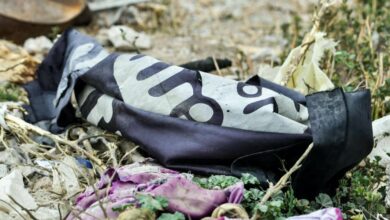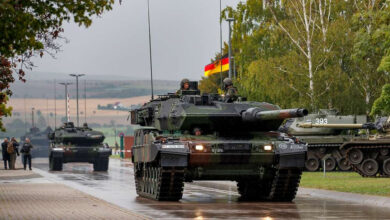ISIS terror suspects planned Kosovo bomb attacks, assaults in France, Belgium
Kosovo national Bujar Behrami was directed by ISIS commanders in Syria, indictment says
Suspected jihadists have been charged in Pristina on suspicion of planning a series of attacks including at a church in Kosovo, two discos and unspecified assaults in France and Belgium, judicial sources told AFP.
Three men and a woman, all from Kosovo and allegedly linked to Islamic State, were arrested earlier this year and charged on October 4, according to an indictment seen by AFP and reported on Saturday, October 13.
The plot leader, named as 26-year-old Bujar Behrami, is also accused of being an organizer of a thwarted attack on the Israeli national football team during a World Cup qualifier in Albania in November 2016.
Gramos Shabani, 26 – who also holds Belgian citizenship – Resim Kastrati, 26 and also known as P.C. Habibi, and Edona Haliti, 25, were arrested in June.
According to Balkan Insight, two other people – Albert Ademaj and Leotrim Musliu – were also charged.
The indictment says Behrami aimed to build a group called “Supporters of the Islamic State in the Land of Eagles” to plan attacks in Kosovo, Albania and Macedonia, and the six were charged with establishing the organization and planning attacks from December 2017 to June 2018, Balkan Insight reported.
Everyone but Behrami has denied the charges.
Ringleader communicated with ISIS in Syria
Behrami, also known as Abu Musab El-Albani, was arrested in September and is also accused of discussing recruitment for suicide attacks with Balkan jihadists fighting with ISIS in Syria and Iraq.
He also has Belgian citizenship.
Behrami began communicating via Telegram with a person in Syria known as A1 in September 2016, Balkan Insight reported.
“We talked about attacks using Kalashnikovs or explosives and had not yet decided about the target,” Behrami allegedly said. A1 then connected him with Albanian Islamic State commander Ridvan Haqifi and they “agreed that would be good to attack the Israelis at the [football] match planned for later that year.”
“The idea was to start the attack with a drone against the Israelis, then with Kalashnikovs,” Berhami is quoted as saying in the indictment, AFP reported.
He said that he had been told by A1 and Haqifi that funds would be made available, Balkan Insight reported.
Eight men were sentenced in May to up to 10 years in prison for the foiled attack.
Haqifi, a recruiter and commander of ethnic Albanian ISIS fighters, was reported killed by a drone strike in February 2017. He had replaced Lavrdim Muhaxheri as a commander in June 2017 after Muhaxheri was killed in a U.S. drone strike in Syria.
In May, prosecutors said some of the eight men indicted for the football plot were directed by Muhaxheri.
Behrami said that he continued communicating with others in ISIS who were not named in the indictment after Haqifi and Muhaxheri were killed.
Planned attacks
According to prosecutors, a planned attack against Serbian Orthodox churches were the most advanced and “halted by the arrests.”
“The idea was to attack groups of people meeting for their religious holidays,” Berhami was quoted as saying.
The attacks on the churches in Gracanica, Mitrovica, Peje/Pec and Prizren were “postponed” after another alleged accomplice failed to find anyone willing to carry them out, he said.
The group were also accused of planning to bomb the NATO-led security force KFOR at two discos in the Serbian enclave of Gracanica.
They had began recruiting volunteers, according to prosecutors, and planned to “put explosives in the discos and trigger them remotely” or to organize “suicide attacks.”
The group also considered a commando-style attack with automatic weapons and hand grenades, “modelled on the 2015 attacks in Paris,” the prosecution said.
Unspecified attacks on public places in France and Belgium were also planned, according to the indictment.
Kosovo foreign fighters in Syria
According to official estimates in Kosovo, around 300 Kosovo nationals have traveled to Syria to fight for ISIS, and more than 50 have been killed.
On October 9, a Pristina court detained for a month a suspect identified only as M.D., who allegedly was involved with “organizations declared terrorist groups by the United Nations” in Syria, AP reported. The suspect was not charged but the court said they had traveled to Syria via Germany several times since March 2013.
Authorities said around 160 people in Kosovo still actively supporting groups in Syria and Iraq.
Kosovo remains ethnically divided since declaring independence from Serbia in 2008.
With reporting from AFP












